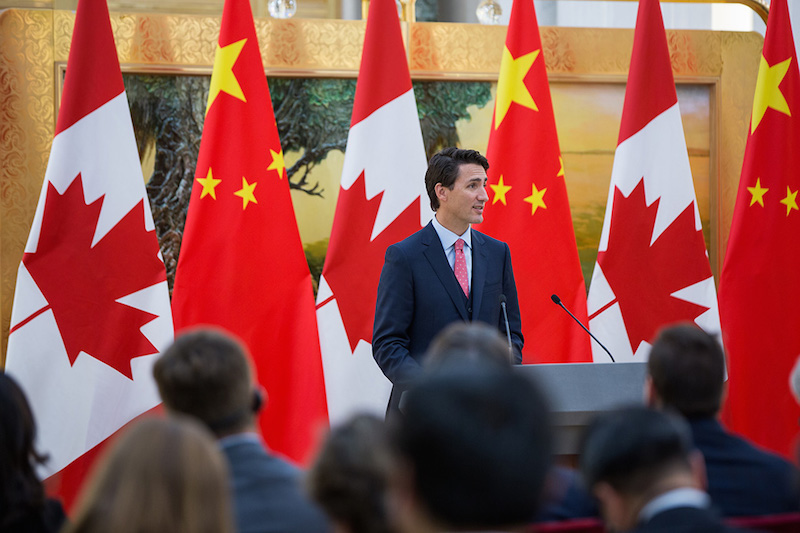Like this article? rabble is reader-supported journalism. Chip in to keep stories like these coming.
Prime Minister Justin Trudeau has been promoting the Canada-European Union Comprehensive Economic and Trade Agreement (CETA) at the G20 summit in Hangzhou, China this weekend.
Sidestepping issues such as the controversial investment protection provisions (that allow transnational corporations to sue governments in special court over public interest legislation that impacts their future profits) as well as provisions that extend the length of patents for pharmaceutical corporations (that add billions in costs for people and their governments), Trudeau told G20 leaders:
“We know that isolationism, that building walls, that closing in on oneself does not create opportunity, it does not create growth. But it’s very tempting to fall into divisive, fearful rhetoric. And that’s one of the things that we have to be very, very strong and compelling in standing against.”
Trudeau also focused his efforts on the European members of the G20: France, Germany, Italy, the United Kingdom and the European Union (represented by both the European Commission and the European Central Bank).
Trade minister Chrystia Freeland says:
“The prime minister is using his time here — it’s very valuable, lots of European countries (are) of course members of the G20 — to push for CETA to get it over the finish line. …There is strong support, but it is going to be very important to work hard with Europeans to talk about the progressive elements in this deal. This is a deal that will be very important for Canada and we’re just working very, very hard, assuming nothing.”
Among the meetings, Trudeau met new British Prime Theresa May, who supports CETA, for the first time in person this weekend. Trudeau also met with European Council president Donald Tusk (the European Council represents the member states of the European Union) and European Commission president Jean-Claude Juncker (the Commission is the executive branch of the EU).
The Canadian Press now reports:
“Canada and the EU have committed to signing the deal this year and ratification in 2017 [but] a senior government source said Ottawa is aware of constraints in countries like Austria and Germany. The government will be doing its best to bring some centre and centre-left groups on side, both publicly and privately, said the source, who described the effort as a real challenge. The source spoke on the condition of anonymity because they weren’t authorized to discuss the issue.”
This past week, Austrian Chancellor Christian Kern said he is opposed to CETA. And while German vice-chancellor Sigmar Gabriel says that negotiations for the United States-EU Transatlantic Trade and Investment Partnership (TTIP) have now failed but “nobody is really admitting it,” he has been supportive of CETA recently (despite his Social Democratic Party’s base being more skeptical about the deal). Other European jurisdictions expressing concerns about CETA include Slovenia, Bulgaria, Hungary, France, the Belgian regions of Brussels-Capital Region, Wallonia, and the French Community of Belgium, and the German states of Bremen, North Rhine-Westphalia and Rheinland Pfalz.
Trudeau and Freeland back the provisional application of CETA, which means 90 per cent of the deal could be implemented before the legislatures of member states can vote on it. Our German allies Campact, foodwatch, and Mehr Demokratie (More Democracy) are now challenging the constitutionality of provisional application in a case before Germany’s Constitutional Court in Karlsruhe.
In terms of key upcoming dates:
September 17 – massive protests will be taking place against CETA across Europe
September 22 – European Union trade ministers meet in Bratislava, Slovakia to discuss the provisional application of CETA
September 26 – Freeland will speak in favour of CETA at the German Social Democratic Party convention in Berlin
October 27 – Trudeau is scheduled to be in Brussels to sign CETA
November 29 – European Parliament International Trade Committee expected to vote on CETA
December/January – CETA could go to European Parliament for plenary ratification vote
This September 6-9, Council of Canadians chairperson Maude Barlow will be on a speaking tour against CETA in Stockholm, Copenhagen and Malmö. On September 17, she will be at the massive anti-CETA rally in Stuttgart, Germany. More than 30,000 people are expected to be at that protest.
Like this article? rabble is reader-supported journalism. Chip in to keep stories like these coming.



